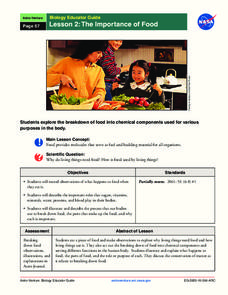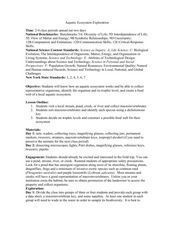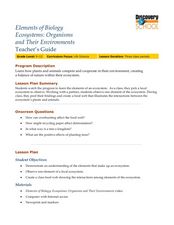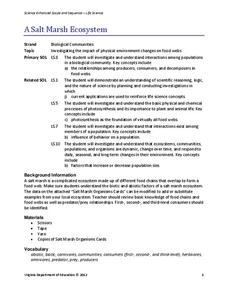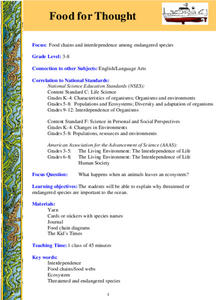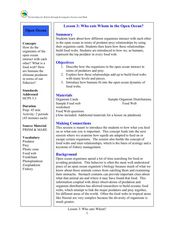Curated OER
Food Webs
Students research an animal to define its food web and life cycle. In this animal life cycle lesson, students research an animal and define its food web. Students then present their animal food webs to the class and note other animals in...
Curated OER
A Coastal Arctic Food Web
High schoolers create a food web of the arctic ecosystem. In this biology lesson plan, students explain how global warming affects this ecosystem. They explain how losing a species affects the entire community.
Curated OER
Food Web Mystery
Students describe typical marine food webs, and explain why food is generally scarce in the deep-ocean environment. They discuss reasons that seamounts may support a higher density of biological organisms than would appear to be possible.
NASA
The Importance of Food
Pupils make observations while eating food. They act out the process of food breaking down in the body and the roles of various chemical components, such as sugar and protein. It concludes with an activity illustrating the process and a...
Curated OER
7th Science Quiz
This seventh grade life science quiz has a professional appearance and well-written multiple-choice questions. However, it seems to cover too broad a variety of biology topics for only 15 questions to fully assess. There is one question...
Curated OER
Aquatic Ecosystem Exploration
Students visit a local stream, pond, creek, or river and collect macroinvertebrates. They sort macroinvertebrates and identify each species using a dichotomous key. Students decide on trophic levels and construct a possible food web for...
Curated OER
Links in the Chain of Life
Using the prairie dog community as an example, middle school ecologists examine the food web. Pairs of learners take one species in the community and research its role in the ecosystem. They share their findings with the rest of the...
Curated OER
Food Webs
Students investigate the concept of an ecosystem and how they are interconnected according to a hierarchy. Students are exposed to the "Lion King" as an example of a food chain and this is very relevant. They answer several key...
Curated OER
Biological Relationships
Create a written document to show knowledge of producers, consumers, decomposers, and symbiotic relationships. To investigate food consumption, your classes will differentiate between types of symbiosis and explain examples of each.
Curated OER
Rocky Shore Food Web Drama
Students explore food chains. In this ecosystem lesson plan, students discover how plants and animals rely on each other for survival. Students research the rocky shore ecosystem and create a skit representing the ecosystem.
Captain Planet Foundation
Energy Flow in the Garden
How can you tell what an owl has eaten? Study the food chain and flow of energy in an ecosystem by dissecting an owl pellet and noting the bones found inside. Additionally, the instructional activity includes a game about consumers and...
Curated OER
Organisms and Their Environments
Young scholars study a local ecosystem and research the organisms to create a food web. In this ecosystem lesson, students view a video and answer questions. They visit a local ecosystem and make a list of organisms to research. Young...
Curated OER
Shark Attack Odds and the Importance of Sharks
Middle schoolers examine an ecosystem. In this food web lesson, students discover the importance of sharks and what threat sharks actually pose to humans. They participate in class discussions and work independently on a couple of...
Curated OER
Building a Terrarium System
Students create their own terrariums. In this ecological model lesson, students create terrariums using soil, seeds, pebbles, and two liter bottles. Students compare the elements of a terrarium to a food web.
Chicago Botanic Garden
Food for Thought: Climate Change and Trophic Cascades
Learners examines the arctic food web with a short video about polar bears and an article about bears and warming temperatures. They design an arctic food web and discuss the trophic cascade that could come from climate change.
Michigan Sea Grant
Food Chains and Webs
Starting with a simple food chain, young scientists interpret the difference and interrelatedness between herbivores, carnivores and producers. They answer questions related to cause and effect of food chain disruptions, including the...
Curated OER
Costa Rican Food Chain
Discuss the animals and plants in the rainforest food chain using this lesson. Learners talk about and do research on the top predators from the Costa Rican region and create a model of one of them in class. They also make a visual model...
Curated OER
Food Chain
Third graders role-play various organisms from a food chain to illustrate how a food chain works. In relay style, 3rd graders fill their cups (stomachs) and, in turn, fill a larger organism's cup (stomach) to visualize the importance of...
Virginia Department of Education
A Salt Marsh Ecosystem
What a web we weave. Pupils use yarn as the primary resource to create a web depicting the intricacies of a salt marsh ecosystem. They participate in a question and answer session, which leads to an in-depth facilitated discussion about...
Montana State University
Everest Extremes: Biodiversity
How many animals can live in a climate as cold as Mount Everest's? Find out with a science lesson all about biodiversity. Activities include research, presentations, group work, coloring maps, and a simulation of a food web.
NOAA
Animals of the Fire Ice
When the sun's rays can't reach the producers in a food web, where does all the energy come from? Extreme environments call for extreme food sources. Young scientists investigate creatures that appear to get their energy from methane...
Curated OER
Food for Thought
Young scholars explore the food chains in a variety of ecosystems and its relationship to the survival of threatened or endangered marine animals or fish in the ocean. The interdependence of the species is investigated in this lesson.
Curated OER
Who Eats Whom in the Open Ocean?
Students examine how organisms interact with one another in the ocean. For this science lesson, students discuss predators and prey in the ocean. Students discuss food webs and how organisms interact with each other.
NOAA
Seafood and Human Health
Whether your young biologists realize it or not, humans play a significant role in marine ecosystems. To help them understand this fact children first create graphical representations that show homo sapiens' place in marine food chains,...





